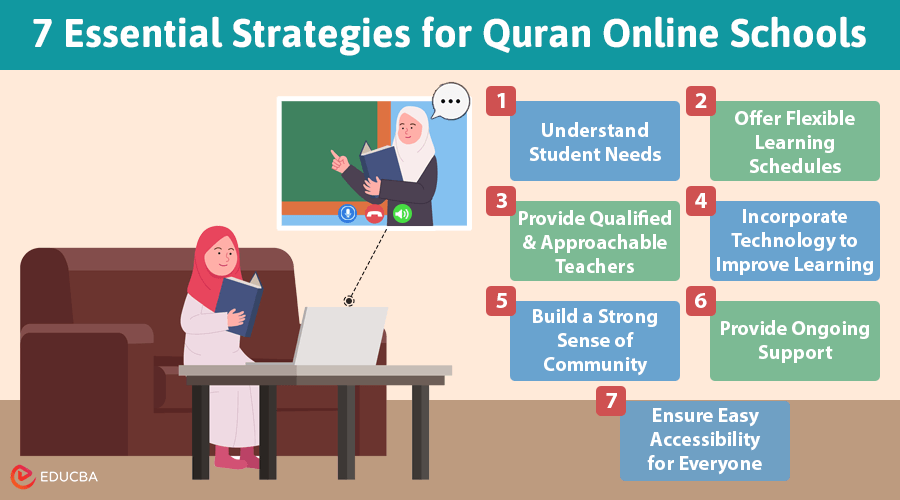
Overview of Quran Online Schools
Many Muslim students have recently turned to Quran online schools for religious learning. These digital platforms provide a convenient and flexible way to learn the Quran and Islamic studies from home. However, to meet the diverse needs of their students, these schools must continuously adapt and improve.
By using one-on-one teaching methods, offering better multilingual support, and creating an inclusive environment for learners from all backgrounds, these online Quran institutions can become essential resources for Muslim students who wish to deepen their understanding of the Noble Book.
7 Essential Strategies for Quran Online Schools to Implement
Digital Quran learning platforms can also support students in non-Islamic areas by offering flexible, personalized lessons, like Hifz classes for kids, to help them memorize the Quran more easily. Here are some strategies that Quran online schools can adopt to enhance their educational offerings.
#1. Understand Student Needs
Every student has different abilities to adapt to things. Some can learn faster and understand the concepts easily in a single lecture. At the same time, some candidates may have trouble memorizing things in one class.
Quran online schools need to recognize this and tailor their lessons accordingly. Teachers should conduct assessments at the start of each course to understand student’s learning journey. This helps institutions adjust the pace of lessons to accommodate each student’s capability, ensuring no one is left behind. Digital Quran schools should also consider the student’s language background, as not all candidates may have the same level of Arabic fluency.
#2. Offer Flexible Learning Schedules
Many students who enroll in Quran online institutions attend regular schools or have other commitments. Digital platforms should provide flexible class timings to better serve students and allow learners to study conveniently.
At an online institution, you are serving students globally, which means there is a time difference. The solution to this issue involves offering various classes throughout the day or providing recorded lessons for those who cannot attend live sessions. Flexibility is key in helping students balance their religious education with other responsibilities.
#3. Provide Qualified and Approachable Teachers
The role of a teacher in online Quran schools goes beyond just teaching the material. They must have specialized knowledge in Quranic studies, ensuring that students receive accurate and profound instruction.
Hiring experienced teachers helps build a supportive atmosphere where students feel comfortable asking questions and talking about their problems. Their expertise makes complex concepts easier for students and enhances their overall online learning experience. Teachers should be friendly and patient because students may need extra help to understand difficult religious concepts.
#4. Incorporate Technology to Improve Learning
Online Quran schools have the advantage of using technology to accommodate Muslim students effectively. Interactive learning tools such as quizzes, multimedia content, and live discussions can make lessons more engaging and help students remember information better.
Institutions should make it easy for teachers and students to communicate using video, chats, and screen-sharing features. Technology can also provide regular feedback, allowing students to monitor their progress and make improvements.
#5. Build a Strong Sense of Community
One downside of online learning is the limited in-person interaction, which can make students feel isolated. Quran online institutions should work to address this by creating digital forums or groups where students can discuss lessons, share insights, and support each other. A strong community support system can motivate students and enhance their commitment to learning.
Schools can also hold virtual events, such as Quran recitation competitions, to bring students together and strengthen their connection to their learning.
#6. Provide Ongoing Support
Teachers’ continuous support through regular assessments helps students track their progress and make improvements if needed. Online schools for Quranic teachings should establish mentorship programs where seniors guide newcomers through their educational journey by sharing their learning experiences. This interaction keeps students motivated and makes learning more enjoyable for them.
Additionally, offering 24/7 access to resources and assistance ensures that students can get help whenever needed, promoting a more complete learning experience.
#7. Ensure Easy Accessibility for Everyone
Not all students have equal access to technology or reliable internet connections. Quran schools should address these challenges by offering resources or suggestions for affordable technology solutions and ensuring their programs are accessible to all students, regardless of location, financial status, or technological limitations.
Providing scholarships or sliding-scale tuition can make education more affordable and accessible for everyone. Schools should ensure their platforms are user-friendly and work on various devices so that students can access their lessons without any technical issues.
Final Thoughts
Online Quran schools have the potential to transform the way Muslim students learn about their faith. By offering flexible learning schedules, personalized teaching approaches, and interactive lessons, these institutions make Islamic education more accessible. From Quran reading to online hifz classes, they focus on each student’s needs, ensuring everyone can understand and connect with Islam, no matter where they live. By providing a welcoming online community, Quran online schools create a positive space for students to grow spiritually and academically. This way, students can learn more about their faith while feeling supported and engaged.
Recommended Articles
We hope this informative article on Quran online schools and strategies to enhance learning provides valuable insights into optimizing your online Quran education experience. Explore these recommended articles for further insights and innovative techniques to improve your online teaching experience.
